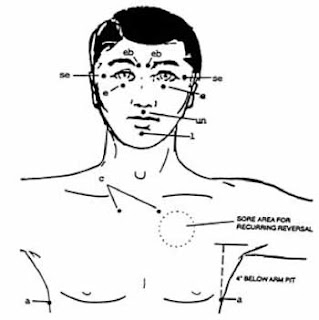
If you heard Danny Gokey sing during rock week on American Idol, you heard and felt his vibrations as he sang
Aerosmith's "Dream On." Vibrations with the correct alignment would be called singing. Vocalizations that are out of alignment get bad reviews. His last note was not in alignment, it sounded more like a disharmonious scream.
Vibrations are another way to talk about our emotional state, sensations in the body ("in the pit of my stomach") thoughts and perceptions.
Your vibration represents your current emotion or the “level” of your mood and feeling about any matter or event. What is great about the way our brain is designed (what Dr. Daniel Amen calls the "hardware of our soul") is that we can create the emotional state or vibration we desire. We can choose our emotional frequency and what we place at the center of our focus.
You can even shift your perceptions and "mental vibration" when stressed by asking a simple question like,
"What is great about this?"
Fundamentally, what is most important in our life isn't what happens to us, but how we choose to react to life's events. That doesn't mean what happens is insignificant, but it does mean that in the end external events do not have to ultimately define us.
I have found EFT the easiest and quickest way to change your emotional state, clear out self doubt and to erase bodily tension. The EFT recipe helps you to acknowledge what you are feeling and then move to a place where you can release it. In the Letter to Galatians the characteristics of a higher or spiritual self are described in chapter 5:22.
"But the fruit of the Spirit is love, joy, peace, patience, kindness, goodness, faithfulness..." NIV
While anger, sadness, guilt, wrath, jealousy etc. are all legitimate and normal emotional reactions. When we linger on these feelings, we see the world differently. It is our perceptions that determines our actions which in the end will determine our destiny.
In just two weeks of experiencing increased guilt, sadness, lethargy, anxiety and irritability, biochemical changes take place in the brain that lead to a mild or moderate depression. Just TWO WEEKS!
The world literally looks brighter when you are more appreciative and in alignment with your life's purpose. Mental and emotional states have a strong impact on our cellular systems.
Play along with me and try a little experiment. Visualize and set a deep sense of something positive in your life - it could be watching a sunset or embracing a loved one (or if you are like my friend Terry Wilson - it would be out to sea on his boat). Now swallow, yes I did say swallow. Notice the level of effort it took to swallow. Did it feel easy to accomplish or difficult? Now think of something negative or even focus on a visual image of the word "hate." Now swallow once again. Notice the level of difficulty.
For most of you, unless you are currently stressed or out of sorts, focusing on something negative made it more difficult to swallow. Anyone who has been anxious giving a speech for the first time can relate to this exercise. This little exercise reveals the impact the mind has on the body. Over time thoughts do become things in the form of stress related illness.
Tapping on acupuncture points while focusing on what is bother you is also effective for eliminating fears and limiting beliefs.
So here is the basic instructions..... If you have questions, successes or challenges let me know!
1. Tune into feeling or issue.
2. Rate intensity on scale of 1 to 10 Ex. "5 represent an increasing discomfort but can handle it"
3. Setup: Tap Karate Chop point and say 3 times, "Even though I am really or have this ____(hurt, angry, outraged, "beside myself" etc.) I deeply love and accept myself" or fully accept the love of God. Some folk with a sense of spiritual journey find the latter affirmation more effective.
The Sequence
Say "this _______ (anger, hurt, debt, guilt, grief etc.) and repeat as you tap on each of the following points listed below (except where noted can tap with end of index and middle finger.(For example while tapping on each of the points listed below, "This "financial stress," or "parenting stress.") If you are really tuned into the emotion you can sometimes get the same results by just tapping on the point without the target phrases.
*Tap 7 - 10 times at each point described below
*top of head with open palm
*eye brow EB
*side of your eye SE
*under you eye UE
*under nose UN
*under lower lip UL
*collar bone point (where the neck meets the notch in your collar bone) tap with open palm
*four inches under your arm pit, tap with your open palm.
Take deep breath and notice change in body sensations, feelings or thought.
If 1 or zero stop.
If 2 or higher repeat the Tapping Sequence saying "this remaining problem ________."
Persist until reaching zero or an acceptable level of distress.
Summary
Signs that it is working can be a flush of energy moving through your body, sighing, and a sense of release. For some folk the experience is gentle and others may experience a flood of emotional release. View the Veteran's video for EFT on this site and witness visible shifts. My recommendation for treating childhood trauma is to see a qualified EFT practitioner instead of attempting self treatment.
For a video demo click on the following link
My EFT Demo Video
(Disclaimer: These EFT oriented products are provided as a good faith effort to expand the use of EFT in the world. They represent the ideas of EFT Practitioner Greg Carpenter and do not necessarily represent those of EFT Founder Gary Craig or EFT. While EFT has been used by thousands of therapists, nurses, social workers, psychologists, doctors, and individuals worldwide with exceptional results and minimal negative side effects, this does not mean that you will not experience any side effects. If you use EFT on yourself or others, you are advised to take full responsibility for yourself and the treatment.)






